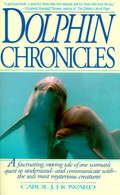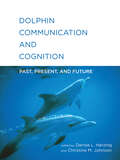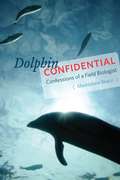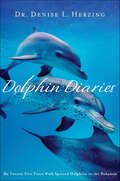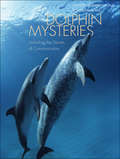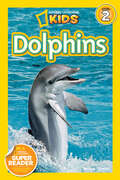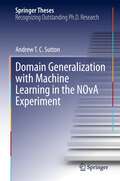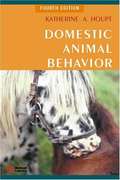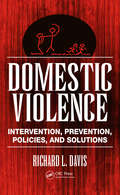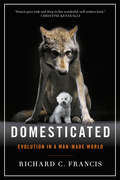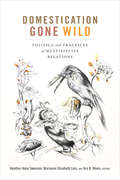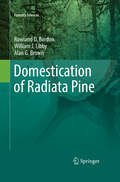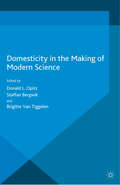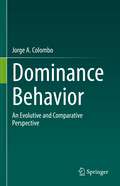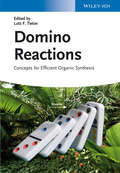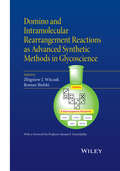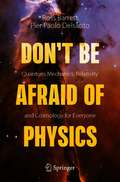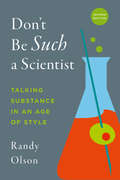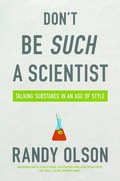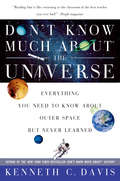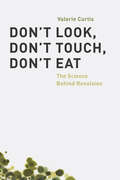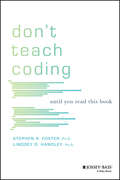- Table View
- List View
Dolphin Chronicles
by Carol J. Howard"Of all the mammals on earth, none has inspired our affection as much as the dolphin. Fascinated by these creatures of myth, magic, and history, we have longed to penetrate the mystery that surrounds them and thrilled to the possibility of communicating with a species other than our own. In 1988 a group of researchers began a revolutionary experiment: they "borrowed" a pair of wild dolphins from the sea, studied them in captivity, and then set them free to continue studying the animals in their home waters. This is the extraordinary story of that project, an ongoing adventure shared by a daring team of humans and two very special dolphins that has built a bridge between disparate worlds and very different creatures. " "Now, Carol J. Howard, a researcher and primary member of the team invites you along on the coast-to-coast odyssey that began when two Atlantic bottlenose dolphins were captured in Tampa Bay, Florida, and transported to Long Marine Laboratory in Santa Cruz, California. Touching, enlightening, and ultimately inspiring, it's a story filled with drama, humor, and heartbreak - one that offers breathtaking possibilities and poses crucial questions for anyone who cares about the future of the dolphins . . . and of the planet itself. "--BOOK JACKET. Title Summary field provided by Blackwell North America, Inc. All Rights Reserved
Dolphin Communication and Cognition: Past, Present, and Future (The\mit Press Ser.)
by Christine M. Johnson Denise L. HerzingExperts survey the latest research on dolphin communication and cognition, offering a comprehensive reference to findings in the laboratory and from the field.Dolphin researchers have collected an impressive amount of data over the last twenty years, thanks to advances in technology for monitoring, recording, and analyzing dolphin behavior as well as increasing interest in exploring and modeling dolphins' cognitive capacities. This volume offers a comprehensive reference to the latest research on dolphin communication and cognition, reporting on findings from both the laboratory and the field. The contributors review a wide range of topics, including vocalization, abstract reasoning abilities, imitation and learning, social cognition, echolocation, and ethical issues in working with cetaceans.The book begins by examining the dolphin brain and its evolution, the anatomy of its unique sound production and reception systems, and its sensory abilities. It next treats communication, reviewing the complexity of dolphins' vocalization, and then describes research on cognition, from both experimental and developmental perspectives. Finally, the book considers the future of dolphin research, including a series of provocative questions that remain unanswered, posed by the volume's expert contributors.ContributorsMats Amundin, Whitlow Au, Ted W. Cranford, Nicola Erdsack, John Ford, Wolf Hanke, Louis M. Herman, Denise L. Herzing, Christine M. Johnson, Petr Krysl, Stan Kuczaj, Marc Lammers, Lori Marino, Paul Nachtigall, Julie Oswald, Adam A. Pack, Heidi Pearson, Sam Ridgway, Jeanette Thomas, Randall Wells, Thomas I. White, Hal Whitehead, Kelley Winship, Bernd Würsig
Dolphin Confidential: Confessions of a Field Biologist
by Maddalena BearziWho hasn t fantasized about the unique thrill of working among charismatic and clever dolphins in the wild? We need not live this solely in our imaginations anymore. With "Dolphin Confidential "Maddalena Bearzi invites all of us shore-bound dreamers to join her and travel alongside the dolphins. In this fascinating account, she takes us inside the world of a marine scientist and offers a firsthand understanding of marine mammal behavior, as well as the frustrations, delights, and creativity that make up dolphin research. In this intimate narrative, Bearzi recounts her experiences at sea, tracingher own evolution as a woman and a scientist from her earliest travails to her transformation into an advocate for conservation and dolphin protection. These compelling, in-depth descriptions of her fieldwork also present a captivating look into dolphin social behavior and intelligence. The central part of the book is devoted to the metropolitan bottlenose dolphins of California, as Bearzi draws on her extensive experience to offer insights into the daily lives of these creatures as well as the difficulties involved in collecting the data that transforms hunches into hypotheses and eventually scientific facts. The book closes by addressing the critical environmental and conservation problems facing these magnificent, socially complex, highly intelligent, and emotional beings. An honest, down-to-earth analysis of what it means to be a marine biologist in the field today, "Dolphin Confidential" offers an entertaining, never less than candid, and always informative description of life among the dolphins. "
Dolphin Confidential: Confessions of a Field Biologist
by Maddalena BearziA &“compelling&” up-close memoir of a career spent among marine mammals and a portrait of the daily lives of dolphins (Publishers Weekly). Working among charismatic and clever dolphins in the wild is a unique thrill—and this book invites us shore-bound dreamers to join Maddalena Bearzi as she travels alongside them. In a fascinating account, she takes us inside the world of a marine scientist and offers a firsthand understanding of marine mammal behavior, as well as the frustrations and delights that make up dolphin research. Bearzi recounts her experiences at sea, tracing her own evolution as a woman and a scientist from her earliest travails to her transformation into an advocate for conservation and dolphin protection. These compelling, in-depth descriptions of her fieldwork also present a captivating look into dolphin social behavior and intelligence. Drawing on her extensive experience with the metropolitan bottlenose dolphins of California in particular, she offers insights into the daily lives of these creatures—as well as the difficulties involved in collecting the data that transforms hunches into hypotheses and eventually scientific facts. The book closes by addressing the critical environmental and conservation problems facing these magnificent, socially complex, highly intelligent, and emotional beings. &“Pairing vivid images of bottlenose dolphins swimming together and caring for one another with descriptions of the meticulous scientific work required to record their behavior, Maddalena Bearzi sheds light on the life of a field biologist…A beautifully written account.&”—Library Journal
Dolphin Diaries: My Twenty-Five Years With Spotted Dolphins in the Bahamas
by Denise L. HerzingDr. Denise Herzing began her research with a pod of spotted dolphins in the 1980s. Now, almost three decades later, she has forged strong ties with many of these individuals, has witnessed and recorded them feeding, playing, fighting, mating, giving birth and communicating. Dolphin Diaries is an account of Herzing's research and her surprising findings on wild dolphin behavior, interaction, and communication. Readers will be drawn into the highs and lows—the births and deaths, the discovery of unique and personalized behaviors, the threats dolphins face from environmental changes, and the many funny and wonderful encounters Denise painstakingly documented over many years. This is the perfect book for anyone who loves these incredibly versatile and intelligent creatures and wants to find out more than the dolphin show at the zoo can offer. Herzing is a true pioneer in her field and deserves a place in the pantheon of naturalists and scientists next to Dian Fossey and Jane Goodall.
Dolphin Mysteries
by Kathleen M. Dudzinski Toni FrohoffDolphins have fascinated humans for millennia, giving rise to an abundance of stories and myths about them, yet the actual details of their lives in the sea have remained elusive. In this enthralling book, Kathleen M. Dudzinski and Toni Frohoff take us into the dolphins' aquatic world to witness firsthand how they live their lives, communicate, and interact with one another and with other species, including people. Kathleen M. Dudzinski and Toni Frohoff are scientists who have collectively dedicated more than 40 years to studying dolphins beneath the ocean's surface, frequently through a close-up underwater lens. Drawing on their own experiences and on up-to-the-minute research, the authors show that dolphins are decidedly not just members of a group but distinct individuals, able to communicate with one another and with humans. Dudzinski and Frohoff introduce a new way of looking at, and listening to, the vocabulary of dolphins in the sea, and they even provide an introductory "dolphin dictionary," listing complex social signals that dolphins use to share information among themselves and with people. Unveiling an intimate and scientifically accurate portrait of dolphins, this book will appeal to everyone who has wanted a closer glimpse into the hearts and minds of these amazing creatures.
Dolphins (Readers)
by Melissa StewartEveryone loves the smile on a dolphin&’s face. Though smart enough to become theme park tricksters, dolphins are first and foremost wild mammals. Melissa Stewart&’s lively text outlines our responsibility to conserve their natural environment. This high-interest book also offers an interactive experience to boost awareness of these adorable creatures.National Geographic supports K-12 educators with ELA Common Core Resources.Visit www.natgeoed.org/commoncore for more information.
Domain Generalization with Machine Learning in the NOvA Experiment (Springer Theses)
by Andrew T.C. SuttonThis thesis presents significant advances in the use of neural networks to study the properties of neutrinos. Machine learning tools like neural networks (NN) can be used to identify the particle types or determine their energies in detectors such as those used in the NOvA neutrino experiment, which studies changes in a beam of neutrinos as it propagates approximately 800 km through the earth. NOvA relies heavily on simulations of the physics processes and the detector response; these simulations work well, but do not match the real experiment perfectly. Thus, neural networks trained on simulated datasets must include systematic uncertainties that account for possible imperfections in the simulation. This thesis presents the first application in HEP of adversarial domain generalization to a regression neural network. Applying domain generalization to problems with large systematic variations will reduce the impact of uncertainties while avoiding the risk of falsely constraining the phase space. Reducing the impact of systematic uncertainties makes NOvA analysis more robust, and improves the significance of experimental results.
Domestic Animal Behavior for Veterinarians and Animal Scientists (4th edition)
by Katherine Albro HouptThis revised and updated new edition of Domestic Animal Behavior addresses advances in communication, perception, cognition and clinical behavior. Of particular importance are advances in the use of psychotropic drugs and the role of underlying disease in some behavior problems.
Domestic Violence and Criminal Justice
by Lee E. RossDomestic Violence and Criminal Justice (Second Edition) offers readers an overview of domestic violence and its effects on society and includes helpful measures to curtail its rapid growth and widespread harm. Geared toward the criminal justice system, this newly revised and updated edition focuses on civil and criminal justice processes, from securing a restraining order to completing an arrest, to the final disposition.Fostering critical thinking in readers, the book covers the extent and nature of domestic violence and intimate partner violence (IPV) in its many forms and delves into the systemic responses to such violence during the COVID-19 era. Going beyond exploring the reactive efforts of policing and prosecution, this edition offers an expanded emphasis on the underpinnings and effectiveness of prevention and intervention, including data on the operations and challenges of domestic violence shelters, and a much-needed focus on victim services, victim advocacy, and social work involvement.This text is ideal for courses in criminal justice, criminology, social work, and sociology. Students will find this text readable, up-to-date, and rich in historical detail.
Domestic Violence: Intervention, Prevention, Policies, and Solutions
by Richard L. DavisDomestic violence does not begin the day an adult heterosexual male decides to beat and batter an adult heterosexual female. Domestic violence is a complicated and multifaceted enigma that includes child, sibling, spousal, intimate partner, and elder abuse. Despite spending billions of dollars on domestic violence, the number of some categories of
Domesticated: Evolution in a Man-Made World
by Richard C. FrancisWithout our domesticated plants and animals, human civilization as we know it would not exist. We would still be living at subsistence level as hunter-gatherers if not for domestication. It is no accident that the cradle of civilization--the Middle East--is where sheep, goats, pigs, cattle, and cats commenced their fatefully intimate association with humans. Before the agricultural revolution, there were perhaps 10 million humans on earth. Now there are more than 7 billion of us. Our domesticated species have also thrived, in stark contrast to their wild ancestors. In a human-constructed environment--or man-made world--it pays to be domesticated. Domestication is an evolutionary process first and foremost. What most distinguishes domesticated animals from their wild ancestors are genetic alterations resulting in tameness, the capacity to tolerate close human proximity. But selection for tameness often results in a host of seemingly unrelated by-products, including floppy ears, skeletal alterations, reduced aggression, increased sociality, and reduced brain size. It's a package deal known as the domestication syndrome. Elements of the domestication syndrome can be found in every domesticated species--not only cats, dogs, pigs, sheep, cattle, and horses but also more recent human creations, such as domesticated camels, reindeer, and laboratory rats. That domestication results in this suite of changes in such a wide variety of mammals is a fascinating evolutionary story, one that sheds much light on the evolutionary process in general. We humans, too, show signs of the domestication syndrome, which some believe was key to our evolutionary success. By this view, human evolution parallels the evolution of dogs from wolves, in particular. A natural storyteller, Richard C. Francis weaves history, archaeology, and anthropology to create a fascinating narrative while seamlessly integrating the most cutting-edge ideas in twenty-first-century biology, from genomics to evo-devo.
Domestication Gone Wild: Politics and Practices of Multispecies Relations
by Marianne Elisabeth Lien Heather Anne Swanson Gro B. WeenThe domestication of plants and animals is central to the familiar and now outdated story of civilization's emergence. Intertwined with colonialism and imperial expansion, the domestication narrative has informed and justified dominant and often destructive practices. Contending that domestication retains considerable value as an analytical tool, the contributors to Domestication Gone Wild reengage the concept by highlighting sites and forms of domestication occurring in unexpected and marginal sites, from Norwegian fjords and Philippine villages to British falconry cages and South African colonial townships. Challenging idioms of animal husbandry as human mastery and progress, the contributors push beyond the boundaries of farms, fences, and cages to explore how situated relations with animals and plants are linked to the politics of human difference—and, conversely, how politics are intertwined with plant and animal life. Ultimately, this volume promotes a novel, decolonizing concept of domestication that radically revises its Euro- and anthropocentric narrative. Contributors. Inger Anneberg, Natasha Fijn, Rune Flikke, Frida Hastrup, Marianne Elisabeth Lien, Knut G. Nustad, Sara Asu Schroer, Heather Anne Swanson, Anna Lowenhaupt Tsing, Mette Vaarst, Gro B. Ween, Jon Henrik Ziegler Remme
Domestication of Radiata Pine
by Alan Brown Rowland Burdon William LibbyIn nature, radiata pine is very localised and an obscure tree species despite the romantic character of much of its natural habitat. That obscure status and the lack of any reputation as a virgin timber slowed its due recognition as a commercial crop. Nevertheless, it has become a major plantation forest crop internationally. It has become the pre-eminent commercial forest species in New Zealand, Chile and Australia, with important plantings in some other countries. It consequently features prominently in the international trade in forest products, in addition to its importance in domestic markets of grower countries. Very fast growth, considerable site tolerances, ease of raising in nurseries and transplanting, and ease of processing and using its wood for a range of products and purposes, have made it the utility softwood of choice almost everywhere it can be grown satisfactorily. Abundant genetic variation and its amenability to other management inputs created special opportunities for its domestication. The story of its domestication forms a classic case history in the development of modern commercial forestry, with trailblazing in both genetic improvement and plantation management; this inevitably meant a learning process that provided instructive lessons, especially for tree breeders dealing with some other species. Paradoxically, the plantation monocultures have played and can continue to play an important role in protecting natural forests and other forms of biodiversity. Given the attractions of growing radiata pine, there were inevitably cases of overreach in planting it, with lessons to be learnt. Economic globalisation has meant globalisation of pests and disease organisms, and the scale on which radiata pine is grown has meant is has been the focus of various biotic alarms, none of which have proved catastrophic. Temptations, remain, however, to pay less than due attention to some aspects of risk management. The chapter structure of the book is based on historical periods, beginning long before any important human influences, and ending with a look into what the future might hold for the species and its role in human and ecological sustainability. Almost throughout, there has been complex interplay between the technical aspects, local social and economic factors, various types of institution, the enthusiasm and drive of some very influential individuals, and tides of economic ideology, threads that needed to be woven together to do the story justice.
Domesticity in the Making of Modern Science
by Donald L. Opitz Brigitte Van Tiggelen Staffan BergwikThe history of the modern sciences has long overlooked the significance of domesticity as a physical, social, and symbolic force in the shaping of knowledge production. This book provides a welcome reorientation to our understanding of the making of the modern sciences globally by emphasizing the centrality of domesticity in diverse scientific enterprises.
Dominance Behavior: An Evolutive and Comparative Perspective
by Jorge A. ColomboThis book approaches two behavioral domains involved with human nature and actions related to dominance, an ancient animal, survival-linked, behavioral drive anchored in basal neural brain circuits. These domains result in latent or manifest conflicts among components of human animal nature and cultural profiles. The first domain refers to evolutive animal behavioral inertias that affect the basic construction of our brain/mind and social behavioral spectrum, underneath cultural and political enclosures. The second domain is considered a consequence of the previous one and involves the concept that the basic animal behavioral drive of dominance interferes with the expression of a truly human, cooperative social construction, and fosters conflicts (based on profit or comparative advantage). This drive tints or conditions our behavior in all its expressions (parochial, social, political, financial, religious, cognitive development). It also fosters social detachment of elite minorities –financially powerful and drivers of human evolutionary trends– from general concerns and collective needs of legions of subdued populations. Additionally, the latter promotes Star Wars factual chimeras and expanding dominance/prevalence and power grip beyond earthbound objectives that promote spatial exploration and scientific objectives. The quest for knowledge is embedded in our behavioral construction but employed by opportunistic – political – strategies that seek dominance/prevalence.Basic, ancestral, animal drives, here focused on dominance, lie underneath our sociocultural expressions, and feed construction of survival, ideology, class prejudices, submissiveness, cooperativity, and technological development. On top of this basic drive, humans have construed additional relational levels (whether of cognitive or emotional nature) expressed as cultural constructions that provide means to attempt to approach a socially acceptable format and public support. Whenever these processes collide or collapse, individual and collective standings tend to generate social changes or individual or collective pathologies. This book should be an exciting read for all those enthusiasts of the human mind, behavior, and cultural evolution ranging from fields such as neuroscience and biology to political sciences and anthropology. Given the breadth of studies as well as the clear language used by the author, students will find this book as a resourceful material for the undergraduate and graduate studies.
Domino Reactions
by Lutz F. TietzeThe follow-up to the successful "Domino Reaction in Organic Synthesis", this ready reference brings up to date on the original concept. The chapters have been arranged according to the name of well-known transformations of the first step and in combination with the formed products. Each chapter is written by an internationally renowned expert, and the book is edited by L. F. Tietze, who established the concept of domino reactions.The one-stop source for all synthetic chemists to improve the synthetic efficiency and allow an ecologically and economically beneficial preparation of every chemical compound.
Domino and Intramolecular Rearrangement Reactions as Advanced Synthetic Methods in Glycoscience
by Zbigniew J. Witczak Roman BielskiThe book consists of a brief introduction, a foreward provided by professor Danishefsky of Columbia University, and about 14 - 16 chapters, each written by one or two eminent scholars/authors describing their recent research in the area of either domino reactions or intramolecular rearrangements in carbohydrate chemistry. Three or four chapters will be reviews. The domino (cascade, tandem) reactions are always intramolecular. They are usually very fast, clean and offer highly complex structures in a one pot process. Intramolecular rearrangements offer very similar advantages and often lead to highly complex products as well. Although many recently isolated carbohydrates fulfill various sophisticated functions, their structures are often very complex. The editors cover the broadest scope of novel methodologies possible. All the synthetic and application aspects of domino/cascade reactions are explored in this book. A second theme that will be covered is intramolecular rearrangement, which is also fast, stereoselective, and often constitutes one or more steps of domino /cascade process. Selected examples of intramolecular rearrangements are presented. Together, both processes offer an elegant and convenient approach to the synthesis of many complex molecules, which are normally difficult to synthesize via alternative routes. It appears that domino and intramolecular rearrangements are ideally suited to synthesize certain specific modified monosaccharides. What is particularly important is that both processes are intermolecular and almost always yield products with very well-defined stereochemistry. This high definition is absolutely crucial when synthesizing advanced, modified mono and oligosaccharides. The choice of contributors reflects an emphasis on both therapeutic and pharmacological aspects of carbohydrate chemistry.
Don't Be Afraid of Physics: Quantum Mechanics, Relativity and Cosmology for Everyone
by Ross Barrett Pier Paolo DelsantoWith the aid of entertaining short stories, anecdotes, lucid explanations and straight-forward figures, this book challenges the perception that the world of physics is inaccessible to the non-expert. Beginning with Neanderthal man, it traces the evolution of human reason and understanding from paradoxes and optical illusions to gravitational waves, black holes and dark energy. On the way, it provides insights into the mind-boggling advances at the frontiers of physics and cosmology. Unsolved problems and contradictions are highlighted, and contentious issues in modern physics are discussed in a non-dogmatic way in a language comprehensible to the non-scientist. It has something for everyone.
Don't Be Such a Scientist, Second Edition: Talking Substance in an Age of Style
by Dr Randy OlsonWhen Randy Olson first described his life-changing encounter with an acting teacher in Don't Be Such a Scientist, it seemed like the world of science was on the cusp of gaining new respect in the public eye. Through his writing, speaking, and films, Olson challenged scientists to toss out jargon in favor of a more human approach, bringing Hollywood lessons to the scientific community. Yet today, in everything from government funding cuts to climate change denial, science is under attack. And while communicating science is more crucial than ever, the scientific community still struggles to connect with everyday people.The time is right for a new edition of Olson's revolutionary work. In Don't Be Such a Scientist, Second Edition, Olson renews his call for communication that stays true to the facts while tapping into something more primordial, more irrational, and ultimately more human. In more than 50 pages of new material, Olson brings his pioneering message to this new age, providing tools for speaking out in anti-science era and squaring off against members of the scientific establishment who resist needed change.Don't Be Such a Scientist, Second Edition is a cutting and irreverent manual to making your voice heard in an age of attacks on science. Invaluable for anyone looking to break out of the boxes of academia or research, Olson's writing will inspire readers to "make science human”—and to enjoy the ride along the way.
Don't Be Such a Scientist: Talking Substance in an Age of Style
by Randy OlsonAfter nearly a decade on the defensive, the world of science is about to be restored to its rightful place. But is the American public really ready for science? And is the world of science ready for the American public? Scientists wear ragged clothes, forget to comb their hair, and speak in a language that even they don't understand. Or so people think. Most scientists don't care how they are perceived, but in our media-dominated age, style points count.Enter Randy Olson. Fifteen years ago, Olson bid farewell to the science world and shipped off to Hollywood ready to change the world. With films like Flock of Dodos: The Evolution-Intelligent Design Circus (Tribeca '06, Showtime) and Sizzle: A Global Warming Comedy (Outfest '08), he has tried to bridge the cultural divide that has too often left science on the outside looking in.Now, in his first book, Olson, with a Harvard Ph.D. and formerly a tenured professor of marine biology at the University of New Hampshire, recounts the lessons from his own hilarious-and at times humiliating-evolution from science professor to Hollywood filmmaker. In Don't Be Such a Scientist, he shares the secrets of talking substance in an age of style. The key, he argues, is to stay true to the facts while tapping into something more primordial, more irrational, and ultimately more human.In a book enlivened by a profane acting teacher who made Olson realize that "nobody wants to watch you think," he offers up serious insights and poignant stories. You'll laugh, you may cry, and as a communicator you'll certainly learn the importance of not only knowing how to fulfill, but also how to arouse.
Don't Eat the Cleaners!: Tiny Fish with a Big Job
by Susan StockdaleEven though they live underwater, ocean animals have to get clean, just like we do. But they get it done in a weird and wonderful way.Just like you have to take a bath and brush your teeth, fish also have basic hygiene practices they have to follow every day. But their approach to cleanliness doesn't just take place underwater—it involves a network of larger ocean animals washed by small fish and shrimp called cleaners at coral reef cleaning stations around the world.Cleaners remove pesky parasites from their customers in return for a tasty meal, serving up to 2000 customers a day. Sea turtles, manta rays, and even sharks line up for a scrubbing in the busy stations, just like at a car wash. Some customers return 100 times daily. And they must remember the important rule if they want a washing by the cleaning crew: DON&’T EAT THE CLEANERS!Readers will delight in this colorful exploration of the remarkable teamwork among coral reef residents. Back matter features images of all 30 animals and a fun matching game: can you find the animals in the book?In her latest nonfiction work, award-winning author-illustrator Susan Stockdale once again proves her talent in creating engaging and entertaining nature books for young readers.
Don't Know Much About the Universe
by Kenneth C. DavisWho dug those canals on Mars? What was the biblical Star of Bethlehem? Were the pyramids built by extraterrestrials?From the ancients who charted the heavens to Star Trek, The X-Files, and Apollo 13, outer space has intrigued people through the ages. Yet most of us look up at the night sky and feel totally in the dark when it comes to the basic facts about the universe.Kenneth C. Davis steps into that void with a lively and readable guide to the discoveries, theories, and real people who have shed light on the mysteries and wonders of the cosmos. Discover why Einstein was such a genius, the truth behind a blue moon or two, the amazing secrets of Stonehenge, and even how one great astronomer lost his nose.With the fun question-and-answer format that has appealed to the millions of readers of his bestselling Don't Much About® series, you'll be taking off on an exciting armchair exploration of the solar system, the Milky Way, and beyond.
Don't Look, Don't Touch, Don't Eat: The Science Behind Revulsion
by Valerie CurtisA scientist delves into what disgusts us and why: “For a book riddled with rancid and revolting things, [it] is surprisingly difficult to put down.” —Times Literary SupplementEvery flu season, sneezing, coughing, and graphic throat-clearing become background noise in workplaces. And coworkers tend to move as far—and as quickly—away from the source of these bodily eruptions as possible. Instinctively, humans recoil from objects that they view as dirty and even struggle to overcome feelings of discomfort once the offending item has been cleaned. These reactions are universal, and although there are cultural and individual variations, by and large we are all disgusted by the same things.In this book, Valerie Curtis builds a strong case for disgust as a “shadow emotion”—less familiar than love or sadness, it nevertheless affects our day-to-day lives. In disgust, biological and sociocultural factors meet in dynamic ways to shape human and animal behavior. Curtis traces the evolutionary role of disgust in disease prevention and hygiene, but also shows that it is much more than a biological mechanism. Human social norms, from good manners to moral behavior, are deeply rooted in our sense of disgust. The disgust reaction informs both our political opinions and our darkest tendencies, such as misogyny and racism. Through a deeper understanding of disgust, Curtis argues, we can take this ubiquitous human emotion and direct it towards useful ends, from combating prejudice to reducing disease.“Curtis, one of the deepest thinkers and cleverest researchers on this part of human nature, turns revulsion into fascination.” —Steven Pinker“Great fun.” —Toronto Star
Don't Teach Coding: Until You Read This Book
by Lindsey D. Handley Stephen R. FosterThe definitive resource for understanding what coding is, designed for educators and parents Even though the vast majority of teachers, parents, and students understand the importance of computer science in the 21st century, many struggle to find appropriate educational resources. Don't Teach Coding: Until You Read This Book fills a gap in current knowledge by explaining exactly what coding is and addressing why and how to teach the subject. Providing a historically grounded, philosophically sensitive description of computer coding, this book helps readers understand the best practices for teaching computer science to their students and their children. The authors, experts in teaching computer sciences to students of all ages, offer practical insights on whether coding is a field for everyone, as opposed to a field reserved for specialists. This innovative book provides an overview of recent scientific research on how the brain learns coding, and features practical exercises that strengthen coding skills. Clear, straightforward chapters discuss a broad range of questions using principles of computer science, such as why we should teach students to code and is coding a science, engineering, technology, mathematics, or language? Helping readers understand the principles and issues of coding education, this book: Helps those with no previous background in computer science education understand the questions and debates within the field Explores the history of computer science education and its influence on the present Views teaching practices through a computational lens Addresses why many schools fail to teach computer science adequately Explains contemporary issues in computer science such as the language wars and trends that equate coding with essential life skills like reading and writing Don't Teach Coding: Until You Read This Book is a valuable resource for K-12 educators in computer science education and parents wishing to understand the field to help chart their children’s education path.
